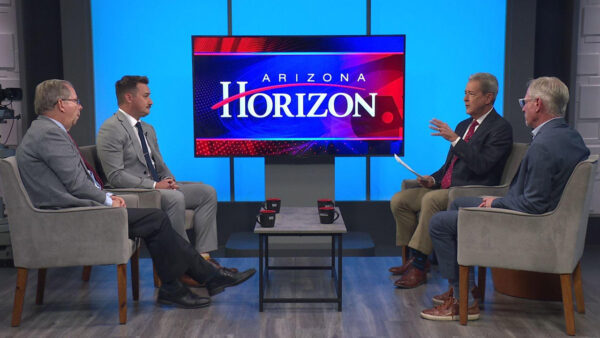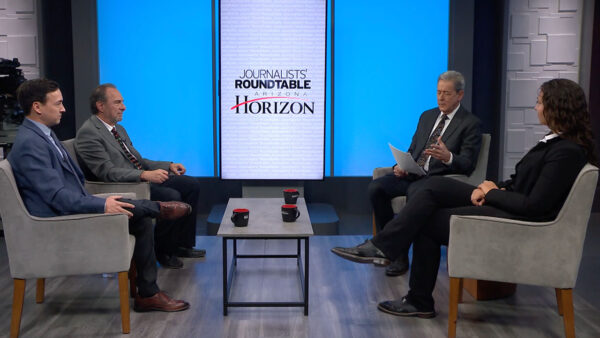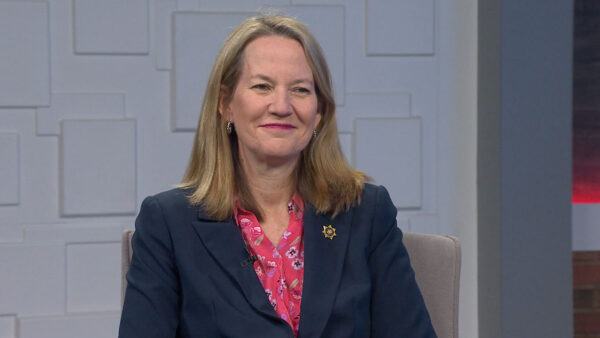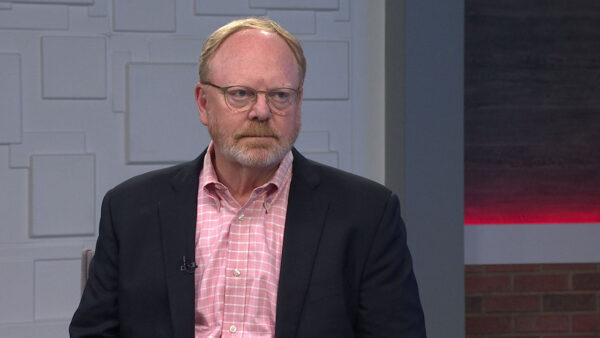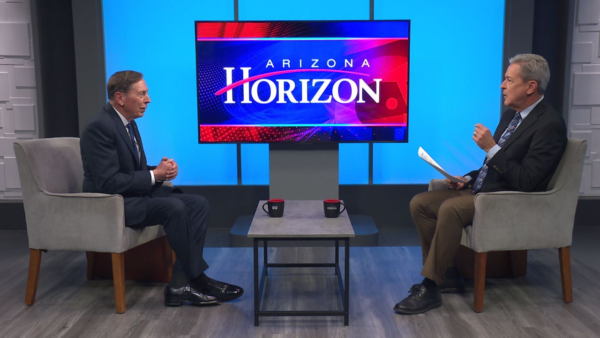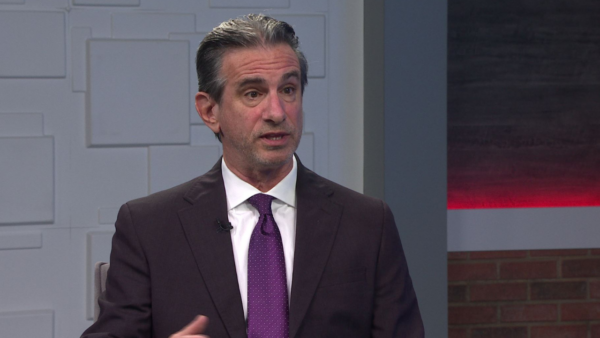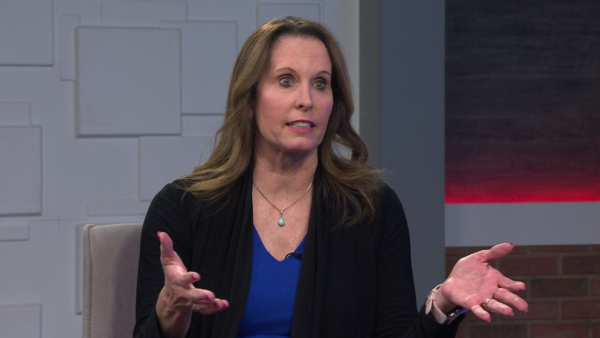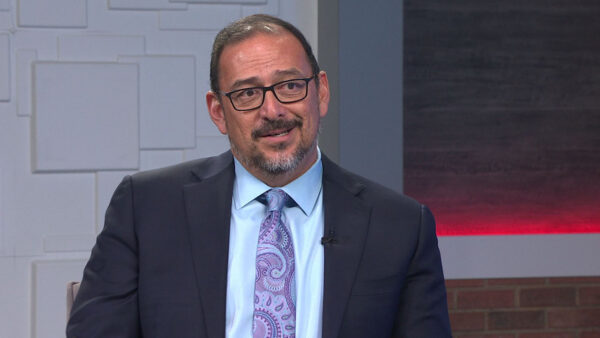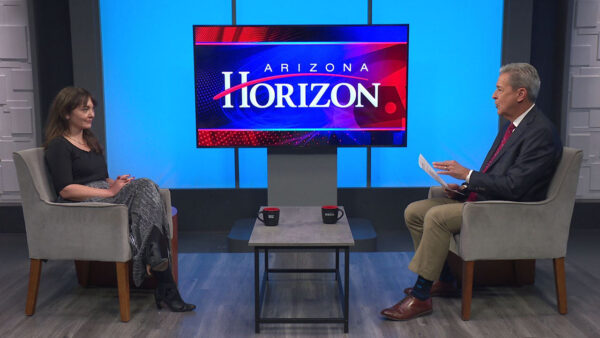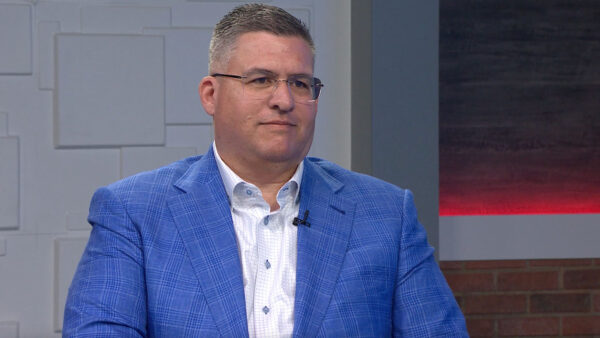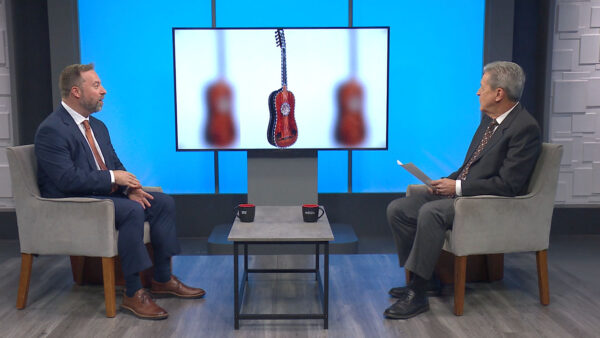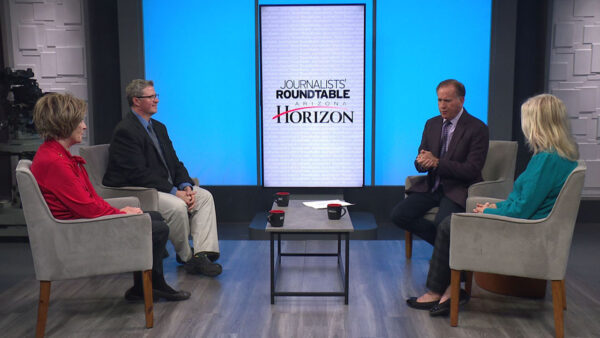A survey of 400 Arizona executives found that education was the number one challenge to doing business in our state. The poll was commissioned by Alliance Bank of Arizona, and will be discussed by the bank’s CEO, Jim Lundy, and Chris Camacho, president and CEO of the Greater Phoenix Economic Council.
Ted Simons: Coming up next on Arizona Horizon -- a new survey shows education is priority one for Arizona CEOs. Also tonight, an overview of the heroin problem in Arizona. And we'll look at concerns regarding fraudulent tax filing. Those stories next on Arizona Horizon.
Video: Arizona Horizon is made possible by contributions from the friends of Arizona PBS. Members of your PBS station. Thank you.
Ted Simons: Good evening and welcome to Arizona Horizon. I'm Ted Simons. And an amendment was introduced to a bill today by Republican representative John Allen that would remove a conflict of interest for Arizona corporation commissioner Andy Tobin. The bill would allow Tobin to vote on issues regarding a rooftop solar company where Tobin's son-in-law works. Tobin had said that he would not vote on issues involving the company on the advice of Corporation Commission attorneys. The Senate approved a bill that would cut the powers of the state's superintendent of public instruction. The bill is designed to settle ongoing few days and lawsuits between the superintendent and the board of education. The superintendent Diane Douglas had earlier testified against the bill, but it passed the Senate by a vote of 24-5. And the Arizona Court of Appeals today upheld a 400,000 fine for campaign finance violations against former Attorney General Tom Horne. The court ruled that Horne did, indeed, illegally coordinate with an independent expenditure committee in his successful 2010 campaign against Democrat Felicia Rotellini. Horne says he will appeal the ruling to the state Supreme Court. And a recent survey of 400 Arizona executives found that education was the number one challenge in doing business in our state. The poll was commissioned by Alliance Bank of Arizona. Joining us now to talk about the survey are Alliance CEO Jim Lundy and Chris Camacho, President and CEO of the greater Phoenix economic council. Good to have you here.
Jim Lundy: Thanks, Ted.
Ted Simons: A study of CEOs, huh? Talk to us about this.
Jim Lundy: Sure. Alliance Bank is a business bank, and our focus is the Arizona business community, and last summer the recovery has been kind of tootling along for a few years now, maybe not as strong as we would like, so we decided it would be a good idea to reach out to Arizona business owners across the sectors, and sort of get what they are thinking about you know, their company, and their willingness to invest in the future, and just, basically, take their business pulse, and so, we did that, and we, we talked to GPEC and the Arizona Commerce Authority and the Chamber, and we sort of ran that by them, and everybody agreed that there are a lot of these studies that get done nationally, but a study on the Arizona business community would be a good idea, so we ran the survey. We designed it this summer and ran it, and in the fall, and the results, while not surprising, I think, were a bit extraordinary in terms of how strongly, across all sizes and industry sectors in Arizona, came out strongly that, you know, investing in education in Arizona is, really, the highest priority that they think state government should be involved in.
Ted Simons: And it sounds like all aspects from investing in k-12 to getting quality and the availability of a workforce, all those things that deal with education, whether on the positive side or not enough on the negative side, I mean, it was really across the board, wasn't it?
Chris Camacho: There is no question, and today's conversations, I had with CEOs, it is paramount, so our ability to produce people is, has become the number one site selection, you know, quotient, for why they selected this market or other mark, so, I will give you history, or a connotation to how companies are making decisions. It used to be about the tax and regulatory environment, and those are a precursor. You have to have a competitive operating environment. The differentiation today, market to market is about how we produce people, so this survey, as Jim and I were talking about, did not surprise me. I guess the only thing that I guess surprised me a touch was the emphasis that immigration was no longer the priority, and that education in our brand was number one. Number one and two.
Ted Simons: And I was going to mention branding. It seemed like improving the image was also weighted heavily?
Jim Lundy: It did, but not as heavily -- it is, it has subsided, and immigration was there, too, and there were a lot of interesting things you know, that came out of the survey, and I am speaking to back up Chris's point, most of the survey respondents thought that state and local government were responsive when it came to permitting, and those kinds of issues, and they thought that the tax and regulatory environment was reasonable. They did not see them as impediments to expanding their business. But, this workforce development issue came up over and over, and here's an interesting thing. Many -- let me -- over half the respondents were small businesses with less than 20 employees. So this is not just a big company that you would expect to maybe have to hire more talented, college educated people. These are -- this is the small business community. 60% of the respondents had companies with revenues under $10 million, and 50%, over 50%, had companies -- owned companies with less than 20 employees, so while I would have expected this sort of resounding support for talent, that Chris mentioned in larger companies, the fact that it came from the small business sector, too, I think, is another indication that this is across the board recognition.
Ted Simons: I see that two and five thought that Arizona was on the right track for healthy business climate. Is that a reflection of the need for better education? Better, better educated workforce?
Chris Camacho: I think that certainly in the market there is a lot of dialogue about the K-12 system and the region to region and state to state, that the population that comes through our K-12 system, that is shifting, and it is shifting in a way that we have to ensure that the top to bottom, we're teaching, you know, in a world class environment. The companies that we want to grow and nurture over time, again, applied research type of emphasis, and research and development and advanced manufacturing and those jobs, you know, not only require four-year degrees, but there is also a tremendous amount of middle skills needs in the market that are through the technical programs, which I was glad to see the legislature and the Governor come together on so I think the business climate, I had these conversations a lot about the tax and the regulatory side, and we have a strong business environment, in terms of the competitiveness, and now it's about super charging the labor force because that is going to be the key differentiator going forward.
Ted Simons: This is the business community from what you saw, regarding the surveys from what you know, in your dealings, and do they see us moving in that direction? Do they think that lawmakers, decision-makers, down at the capital, do they understand what's going on out there?
Jim Lundy: Well, I don't know that the survey addressed -- well, it did say, do you think -- what do you think that the state and local Government would do to improve the economic environment and as we have said, overwhelmingly, invest more in education. How do you think that they are doing in education that got lower marks? So, I think that on balance, they think that there is a lot of room for improvement here. Here's another interesting thing. 40% of the respondents, I mean, said that the number one thing that they liked about the workforce was its willingness to learn, so they were not saying that only 40% have a willingness to learn but that's a pretty good plurality to say that, so we think that we have got a willing workforce but 41% said that the biggest weakness was math and science skills, so you sort of have this mismatch between yes, we have a willing workforce, but they just don't have the technical skills.
Chris Camacho: And can I comment on that, Ted? When we talk to clients, albeit San Francisco-based tech companies or Carlisle, a recent company entering the market from Carolina, they are assessing in an analytical way the STEM workforce, the production today and the future production of the K-12 system and how that feeds the technical schools. The emphasis on STEM, and that was the findings, we can teach the people in the marketplace if they are willing and ready to learn, but that the skills you cannot replace the technical skills, math and science, that STEM curriculum needs to be elevated.
Ted Simons: Okay. So bottom line, what do we take from this survey? What do lawmakers and what does everybody came from this?
Jim Lundy: What I take from it, the realization on a broad segment of the, of the people who run companies here, small business to large, we need to invest in education. And education is an investment in the future, the quality of the workforce, and really the future of the state. As opposed to an expense.
Ted Simons: And when that message gets out there, that is something that you will be addressing as far as the businesses looking to relocate because it sounds like they are looking at education number one, as well.
Chris Camacho: There is no question, and that's a national trend. I think that the take away from the study in addition to what Jim alluded to, six out of ten business leaders today, are going to be hiring new people, going forward so there is a lot of optimism without this market, that the 20-year position of the market is we look ahead, and it will be how we produce people, if we can sustain this type of advanced industry job growth.
Ted Simons: Interesting, good to have you here.
Chris Camacho: Thanks.
Ted Simons: Appreciate it.
Jim Lundy: You bet.
Jim Lundy: CEO of Alliance Bank of Arizona,Chris Camacho: President and CEO of the Greater Phoenix Economic Council








